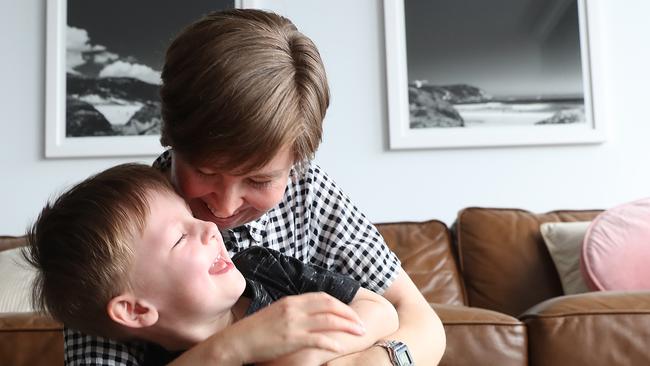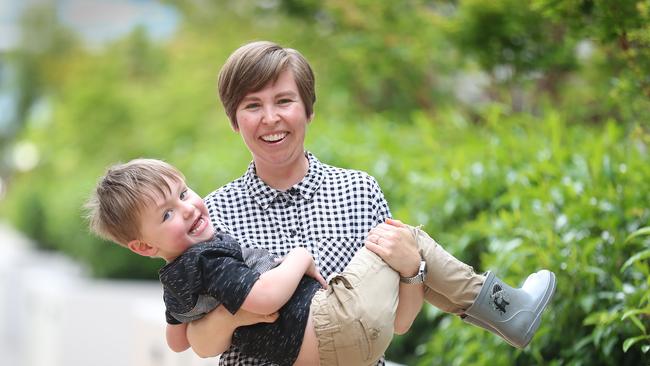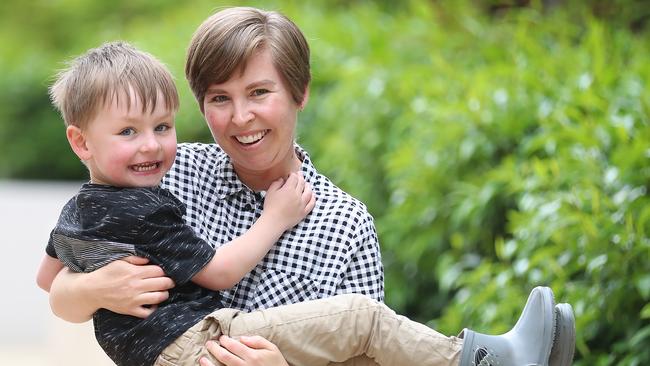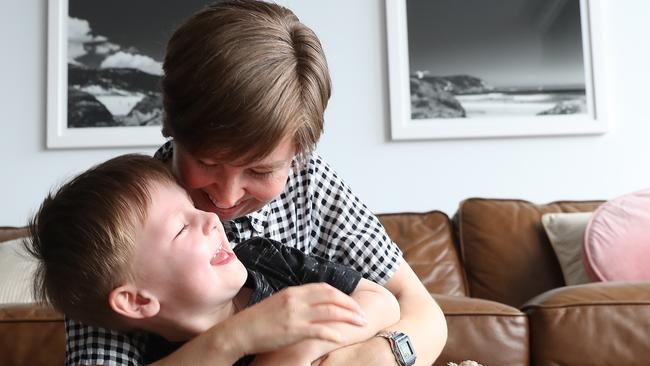Seek help early for depression during pregnancy, a mother urges
BREE Dunbar’s biggest fears during pregnancy was that she would look down at her newborn son and be filled with hate. Now, the loving mother is urging other women to get help for depression and anxiety during pregnancy.

VIC News
Don't miss out on the headlines from VIC News. Followed categories will be added to My News.
BREE Dunbar’s biggest fears during pregnancy was that she would look down at her newborn son on her chest for the first time and be filled with hate.
She knows this is a strong and controversial word.
But that’s what antenatal depression and anxiety can do.
It snatches the happy hormones and “glow” of pregnancy.
It takes the rosy daydreams of maternity leave and fantasies of this little-human, and instead inserts in your brain a dark, ruminating slide show of illogical hopelessness and dread.
ANTENATAL ANXIETY CHANGES PLACENTA GENE EXPRESSION
Every kick you feel from the inside is another sickening reminder that you’re already not coping now, so how are you going to keep another human being alive in a few short months?
What sort of woman are you if you cannot cope with being pregnant?
Your life is over. You will never be happy again.
“I would often think about my life with a newborn baby. They weren’t daydreams, they were nightmares,” the now 37-year-old said.
“I could only imagine negative things. I could only see myself not coping and struggling.
“The depression robbed me of any joy and any fantasies about what my baby would be like, or what I would be like as a mother.”

Bree and her partner Dave had spoken about having a child. It was something they wanted in their future.
But after falling pregnant without trying, the unrelenting morning sickness that started within the first few weeks, the chemical and hormonal changes, and the lack of control at the bodily changes, “flipped the depression switch” in her brain.
“You’re ashamed,” she said.
“At the time you feel like you’re the only person who has felt like that, that you’re a terrible person and it’s a reflection on your character.
“I always thought being pregnant would be the most magical time of my life.
“At the time I got pregnant, I was probably at my most confidence and mentally well that I had ever been. I was in a great relationship with a great partner, I was finishing my studies, I felt really confident about my life and myself. That had been a journey.
“The antenatal depression completely wiped away any confidence I ever had. I just wiped it away.”
Pregnancy increases a woman’s chance of developing depression, with one in 10 pregnant women affected.
The risk of anxiety during pregnancy is heightened, too.
When work colleagues or friends suspected something wasn’t right, Bree would put it down to the morning sickness.
“It was like having the worst hangover of your life, times 10, and knowing you were going to wake up the next day and feel exactly the same way and you didn’t know when it was going to end,” she said.
“Everyone had told me I’d feel fine after the first trimester. I was just hanging out for that 12 week mark for things to turn around.”
But the nausea didn’t relent as she had been told. Grim thoughts consumed her mind.
“I felt like at around the 12 week mark, a light in my mind was flicked off,” she said.
“I was groping around in the dark trying to flick it back on, and I could just not find the light switch.
“I had times in my life where I had felt depressed and anxious. The big difference between those periods in my life and during my pregnancy, was in those past periods there was a light at the end of the tunnel. But this time I felt like there was nothing I could do to get out of the hole.”

With the support of her partner and her mum, she sought help from the Centre for Women’s Mental Health at the Royal Women’s Hospital.
“I had gotten to the point where I wasn’t functioning,” she said.
“I had to use every bit of strength to get out of bed each day.
“When you have antenatal depression, it’s almost impossible to bond with this baby that is growing inside of you. When I was pregnant, I didn’t feel that bond at all.”
She starting seeing a psychiatrist once a week at the hospital, and saw the same obstetrician and midwife throughout.
“When I was feeling like there was absolutely no hope, the only thing that gave me the slightest glimmer of hope was when Elizabeth my psychiatrist would tell me stories about other women who had post-natal depression and they’d been able to recover,” she said.
They also supported her request to have an elective caesarean as a way to minimise the anxiety of labour.
“A lot of people find Caesareans for mental health reasons very controversial and confronting, but I believe it was the right choice for me,” she said.
“It’s been quite a process to accept how that’s happened. I’ve had to let go of how I thought giving birth could be.”
Incredibly, Bree started to feel better soon after the birth.
To her own surprise in the operating theatre, she became curious to see the little face of the baby she had carried inside her all year.
“I thought I’d have a really strong reaction when they put him on my chest and I saw this baby that had made my life hell for nine months,” she said.
“I expected to hate him, or not feel much. But when I looked at his face I definitely didn’t hate him.
“He was pink and perfect and beautiful.
“He looked like me and my side of the family straight away.”

The next morning when her psychiatrist came to visit, Bree said she knew she was already starting to shed the skin of the different woman she had become.
“She sat at the end of the bed and asked how I was going. I said to her; ‘I think I love him’. That was the moment I knew I was going to be OK.
“Parenthood is hard, but I’ve thrived as a mother.
“Being able to cope with motherhood has helped me rebuild my confidence that I lost during pregnancy.”
Her son Ari is now four; a “happy and healthy” boy who has inherited her love of laughter and silliness.
Bree is telling her story with the hope she can reach other women, who right now feel as hopeless as she did four years ago.
“I was a different person. Looking back, I feel so sorry for that woman,” she said.
“There is so much awareness about post-natal depression, but a lot of people don’t even know there is a thing called antenatal depression.
“People dismiss it as just hormones fluctuating, but that prevents women from getting help.
“I truly didn’t believe I would ever be happy again. I want people to know that they will recover. I’m living proof that you can.”
For mental health support, contact the Perinatal Anxiety & Depression Australia National Helpline on 1300 726 306


